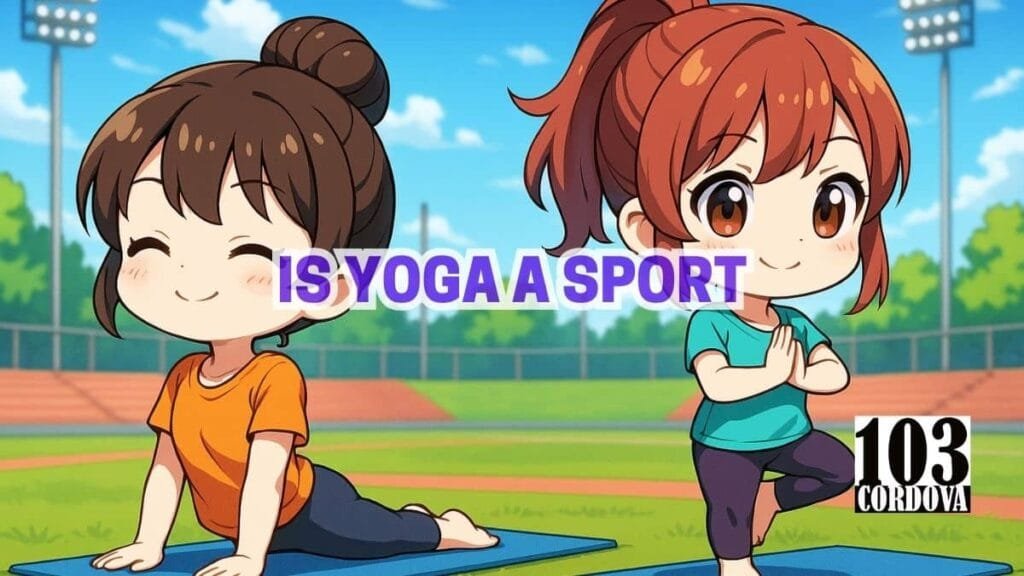Yoga is a practice that many people use to stay fit, relax their minds, and feel more balanced.
As more people try yoga, a common question comes up: Is yoga a sport or something more?
Some see it as a workout with tough poses and physical goals, while others follow it as a daily way of living.
Yoga includes movement, breathing, and mindfulness, which affect both the body and the mind.
Let’s explore how yoga fits into modern life—and whether it should be seen as just a sport or a full lifestyle beyond the mat.
1. Is Yoga Just for Relaxation?
Yoga is often linked to relaxation, helping people calm their minds and relieve tension, but this is only one part of the practice.
Regular yoga practice involves much more than just sitting in stillness; it includes a wide range of asanas that require concentration, strength, and flexibility.
These asanas, or physical postures, challenge both the body and mind, demanding focus and endurance that go beyond simple relaxation.
Additionally, yoga incorporates specific breathing techniques, known as pranayama, which not only calm the mind but also improve mental clarity and control.
Practicing yoga as a sport adds another layer of physical intensity, as more advanced postures test balance and stamina.
This deeper approach allows individuals to build strength, develop mental resilience, and grow holistically.
Simply viewing yoga as a relaxation technique overlooks its full potential as a dynamic and transformative practice.
🧘 How to Select the Ideal Bulk Yoga Mats for Your Studio or Gym
2. The Physical Demands of Yoga
Contrary to popular belief, yoga can be highly physically demanding.
Many yoga poses require significant core strength, balance, and flexibility, challenging muscles that are often ignored in other forms of exercise.
Advanced poses like the crow pose or headstands are particularly intense and require long-term practice to master.
It is not just gentle stretching but a full-body workout that engages both large and small muscle groups.
These demands make yoga comparable to physically intensive sports, though the focus remains on personal growth rather than competition.
🧘 What Sets Australian Yoga Mats Apart in the Global Market
3. Yoga as a Form of Exercise
Yoga is a full-body exercise that improves strength, flexibility, and stamina through slow, careful movements.
Many styles of yoga involve physical effort that can be as challenging as gymnastics, especially when practicing poses that require balance and control.
Because of this, yoga can help an athlete build better body awareness, reduce injury risk, and recover more easily after training.
It also teaches breathing techniques that support heart health and improve how the lungs work during movement.
Unlike typical workouts, yoga focuses on both the body and the mind, often including quiet time or meditation that brings a sense of peace.
This connection between movement and calm thinking adds a layer of spirituality that many other exercises do not offer.
Whether used alone or to support other sports, yoga is a powerful way to stay fit and balanced in both body and mind.
🧘 The Importance of Investing in a High-Quality Cover for Your Yoga Mat to Enhance Your Practice
4. Yoga vs. Traditional Sports
Yoga differs significantly from traditional sports, which often emphasize competition, winning, and achieving records.
In yoga, the focus is inward, promoting self-awareness and personal progress rather than beating an opponent or scoring points.
While sports tend to create physical tension due to their competitive nature, yoga aims to relieve tension and cultivate balance between body and mind.
The practice is also non-judgmental, allowing people to progress at their own pace without external pressure.
This key difference places yoga in a unique category, distinct from conventional sports.
🧘 How the Benefits of the Low Lunge Pose Can Elevate Your Yoga Practice

5. Yoga’s Mental and Spiritual Benefits
Yoga offers significant mental and spiritual benefits that set it apart from many forms of physical activity.
The combination of breath control, meditation, and mindful movement helps reduce stress, improve focus, and foster emotional resilience.
Spiritually, yoga encourages a deeper connection with oneself, promoting peace and a sense of purpose beyond the physical body.
Many practitioners find that yoga helps them develop mindfulness, allowing them to live more fully in the present moment.
These mental and spiritual rewards add a unique layer to the practice that is absent from most sports.
🧘 How the Aerial Yoga Tree Pose Can Alleviate Stress and Enhance Mental Clarity
6. Healing Through Movement: How Yoga Helps in Therapy and Recovery
Yoga is often used by doctors and therapists to help people heal from injuries or deal with stress and anxiety.
Some yoga poses can gently stretch and strengthen the body, making it easier for people to move after an illness or injury.
Breathing exercises in yoga help calm the mind, which is useful for those dealing with sadness, worry, or trauma.
Yoga is safe for many people and can be changed to fit different needs, like sitting in a chair or using support.
Because it helps both the body and the mind, yoga is more than a sport—it can be part of a healthy and healing way of life.
🧘 The Significance of Bow Pose in Bikram Yoga for Developing Strength and Flexibility
7. Yoga’s Cultural Roots
Yoga’s origins trace back to ancient India, where it was initially practiced as a spiritual discipline for self-realization and inner peace.
Unlike modern fitness trends, yoga was deeply intertwined with philosophy, meditation, and ethical principles such as non-violence (ahimsa) and truthfulness (satya).
Historically, yoga was never intended to be a competitive activity but rather a personal journey toward enlightenment.
Over time, yoga has evolved to include various physical postures, but its core remains rooted in promoting harmony within the mind, body, and spirit.
These rich cultural roots demonstrate that yoga’s purpose extends far beyond physical fitness.
🧘 The Value of Incorporating the Cat Tail Yoga Pose into Your Routine
8. The Social Side of Yoga
Though yoga is often practiced individually, it has a strong social element, particularly in group settings like yoga studios or community events.
Practicing yoga with others fosters a sense of belonging and support, creating shared experiences that strengthen social bonds.
Group classes allow individuals to connect with like-minded people who share their interest in health and well-being.
In addition, yoga communities often emphasize inclusivity and acceptance, welcoming people from all backgrounds.
This social aspect of yoga reinforces its status as more than just a personal practice but also a way to build community.
🧘 The Essential Role of Easy Pose in Promoting Stress Relief
9. Yoga’s Growing Popularity
Yoga has grown tremendously in popularity over the past few decades, with people from all walks of life embracing it for both fitness and mental well-being.
Yoga studios are now common in cities worldwide, and online classes have made it accessible to those who prefer practicing at home.
Its adaptability has contributed to its rise, allowing individuals of all ages and fitness levels to participate.
The practice has evolved to suit modern needs while maintaining its core principles, making it appealing to a broad audience.
This growth shows that yoga’s reach extends beyond exercise, drawing people into a holistic lifestyle.
🧘 How to Perfect the Bending Tree Pose to Improve Balance and Flexibility
10. Yoga: A Sport for Everyone?
Yoga’s inclusivity is one of its greatest strengths, as it can be tailored to suit individuals of different abilities, ages, and fitness goals.
Unlike many traditional sports, which may have strict entry barriers, yoga welcomes everyone with open arms.
Whether someone is seeking physical strength, mental clarity, or spiritual peace, yoga offers something for all.
Its flexibility makes it accessible to beginners and advanced practitioners alike, allowing each person to grow at their own pace.
This adaptability supports the idea that yoga is not just a sport but a practice for everyone, regardless of background.
🧘 Stay Committed to Your Yoga Journey
11. The Future of Yoga
The future of yoga appears bright, as it continues to evolve and integrate into various aspects of modern life.
With more people recognizing its benefits for both body and mind, yoga is expected to maintain its influence in fitness, wellness, and even therapy.
Innovations in teaching, such as virtual classes and hybrid practices, are likely to expand yoga’s accessibility even further.
However, as yoga grows, it will be important to preserve its core values of mindfulness, compassion, and personal growth.
The future may see yoga balance between its traditional roots and its modern adaptations.
🧘 Premier Yoga Studio in Marikina
💡 Conclusion
Yoga cannot be confined to the category of a sport, as it encompasses much more than physical exercise.
While it shares certain aspects with sports, such as physical challenge and discipline, it also involves mental, emotional, and spiritual elements that set it apart.
Yoga’s holistic approach to well-being makes it a lifestyle for many practitioners, offering benefits that reach far beyond the mat.
Ultimately, yoga is not simply a sport but a transformative practice that nurtures both body and soul.
Whether practiced for fitness or personal growth, yoga offers something deeper than competition alone.
🧘 Our Services
Join our yoga classes designed for all ages, located at 103 Cordova Tower, Marquinton Residences, Cirma Street, Sto. Nino, Marikina City.
Whether you’re a beginner or an experienced yogi, we offer a welcoming space to improve your flexibility, strength, and mindfulness.
For inquiries or to book a class, feel free to reach out via Facebook, our site’s contact form, or by calling 09176225780.
Our classes are tailored to meet the needs of every individual, fostering both physical and mental well-being.
Start your yoga journey with us today and experience the benefits of a balanced and healthy lifestyle.

